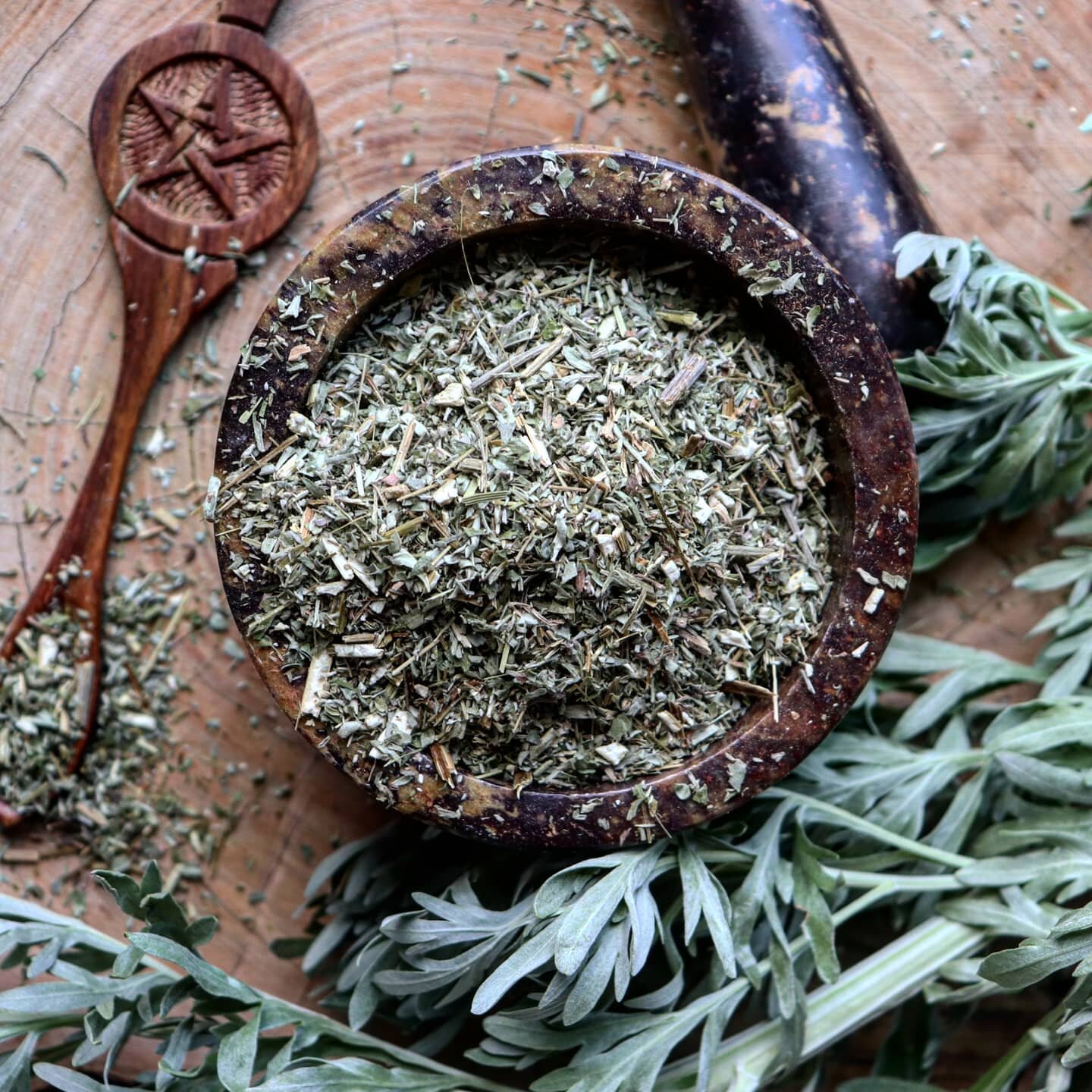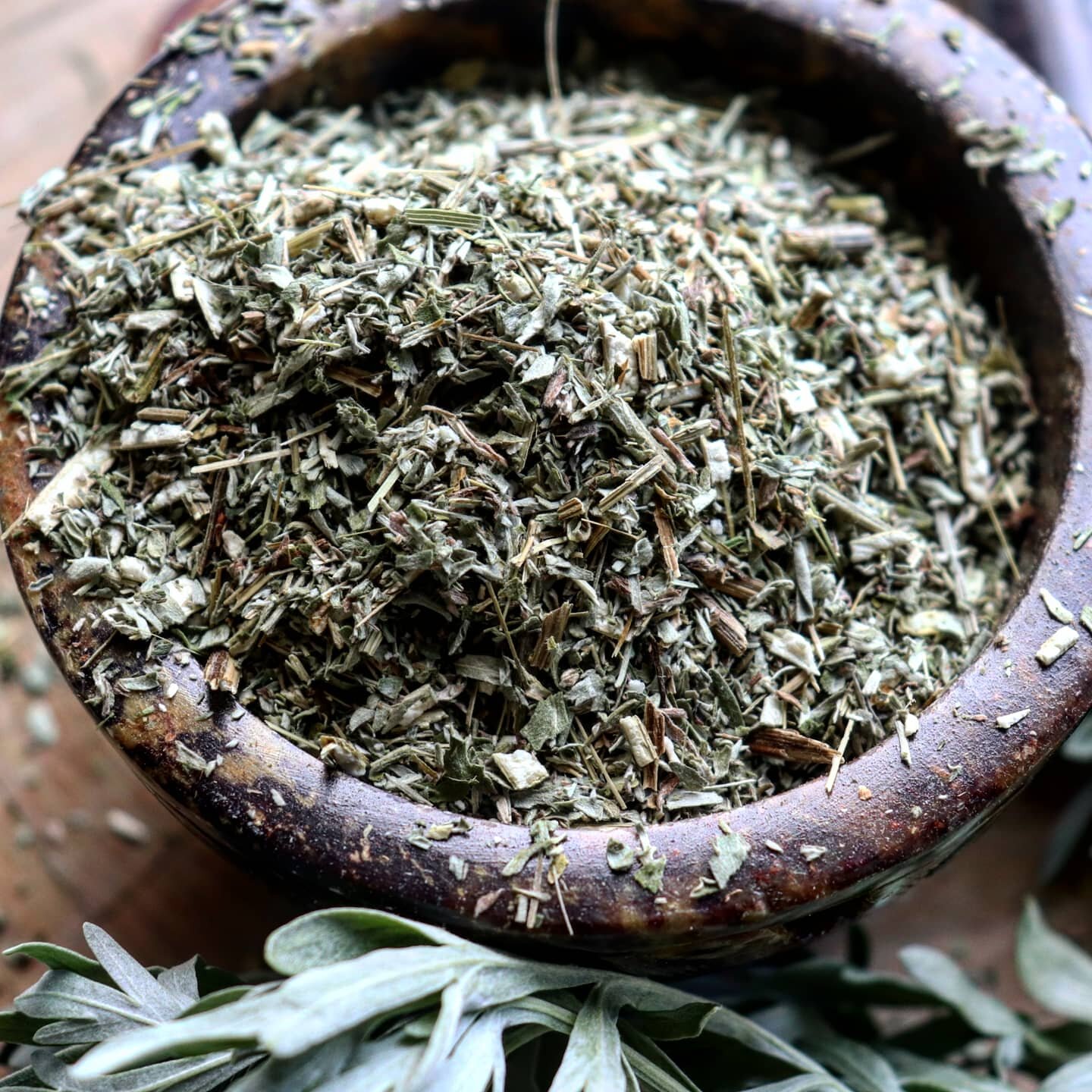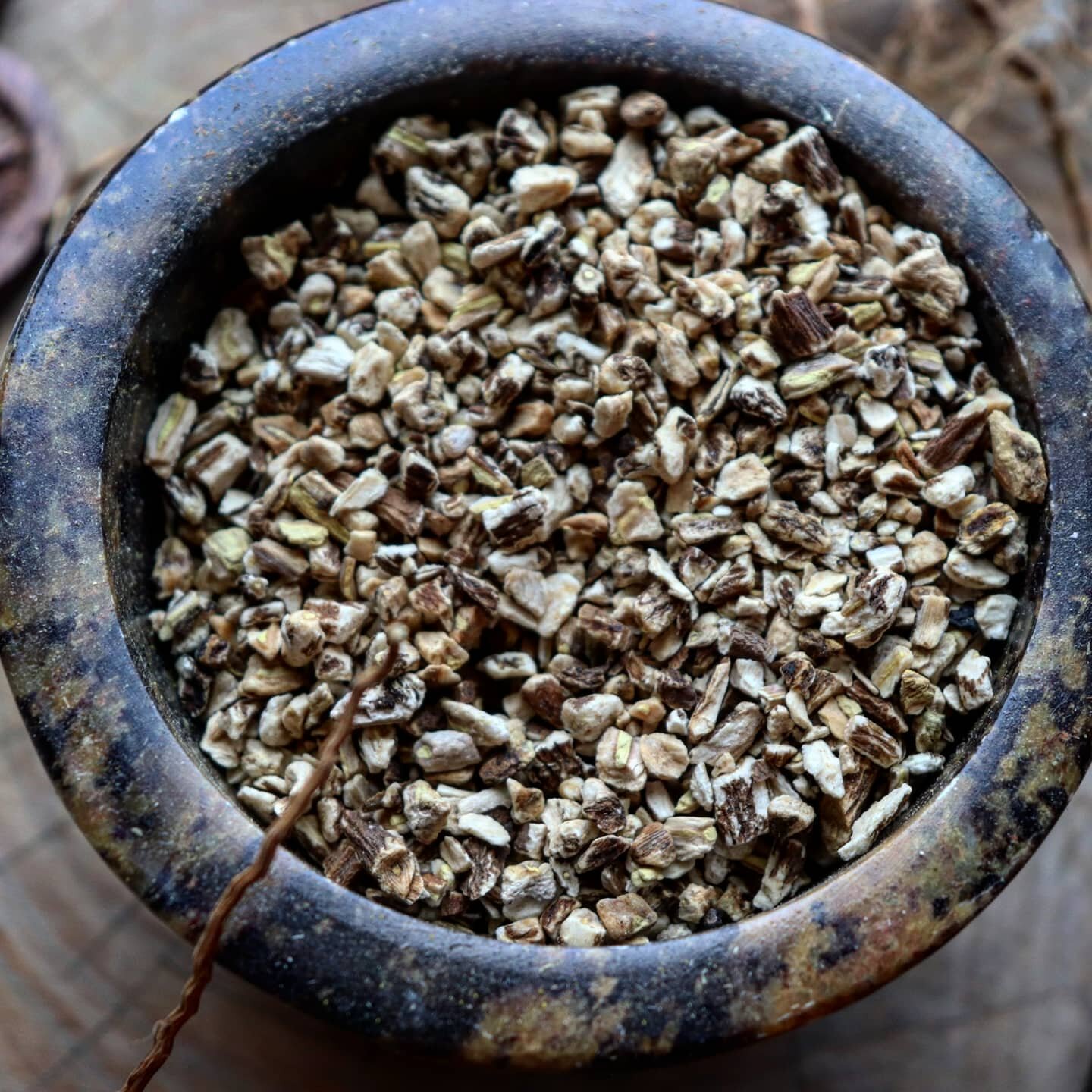 Image 1 of 2
Image 1 of 2

 Image 2 of 2
Image 2 of 2



Wormwood (leaves)
Artemisia absinthium
Cut and Sifted—available in 1 ounce or 1/2 ounce and packaged in a plastic pouch.
An aromatic and bitter herb, wormwood was once sought after as an ingredient for brewing beer before hops eventually replaced it. Artemisia absinthium is a member of the Asteraceae family and can be found growing wild along roadsides and disturbed places throughout Europe, Siberia, and the United States. Historically, wormwood herb was soaked in various liquors and is a notable ingredient in absinthe. The plant can be infused in herbal tea blends, used in tincturing, and incorporated into other botanical formulations.
An ancient proverb claims, “as bitter as wormwood”, and indeed, wormwood is considered one of the most bitter herbs. It can be found growing wild in disturbed soils and is often cultivated in gardens, acting as a companion plant to deter pests and weeds. Historically, dried leaf bundles were hung inside the house and strewn in pantries and drawers for both its aromatics and to keep unwanted visitors away.
History + Folklore
Wormwood, once a main ingredient in beer brewing, has since been replaced by hops. European folklore suggests that wormwood was utilized in making love potions and even acted as a remedy for accidental poisonings from mushrooms and other plants. Its scientific name, Artemisia, is derived from Artemis, the Greek goddess of wild creatures and the hunt. Greek legend states that the plant was delivered to Chiron, the father of medicine, by the goddess herself.
The common name, wormwood, is suggested to have come from its historical use in expelling intestinal worms. Although, another reported root may originate from the Anglo-Saxon word “wermode” or “wermuth”, meaning “mind preserver”.
It is said that wormwood first grew from the path of the serpent as it exited the Garden of Eden.
‘While Wormwood hath seed get a handful or twaine
To save against March, to make flea to refraine:
Where chamber is sweeped and Wormwood is strowne,
What saver is better (if physick be true)
For places infected than Wormwood and Rue?
It is a comfort for hart and the braine
And therefore to have it it is not in vaine.’
~ Tusser 1577
Magickal
Psychic Powers, Protection, Love, Calling Spirits
Masculine, Mars, Fire
Wormwood is burned in incenses designed to aid in developing psychic powers and is worn for this purpose.
Combined with mugwort and burned, wormwood is useful for calling up spirits. Make sure the area is well-ventilated as the smoke can be very irritating to the eyes and throat and is toxic if inhaled. It is also said to be useful in banishing spirits.
If burned in graveyards, the spirits of the dead will rise and speak.
Place several tablespoons of dried wormwood leaves and flowers in a jar, cover with light olive oil and seal. Let this steep for several weeks in a cool place, strain and use as an anointing oil for yourself or your divination tools.
Wormwood flowers and leaves can be added to magical sachets for protection against accidents. Hang these in your car or carry them on your person.
Warnings: Not for use during pregnancy or lactation. Not for long-term use; do not exceed recommended dose. Not to exceed 1.5 g of dried herb in tea, two to three times daily. We recommend that you consult with a qualified healthcare practitioner before using herbal products, particularly if you are pregnant, nursing, or on any medications.
Artemisia absinthium
Cut and Sifted—available in 1 ounce or 1/2 ounce and packaged in a plastic pouch.
An aromatic and bitter herb, wormwood was once sought after as an ingredient for brewing beer before hops eventually replaced it. Artemisia absinthium is a member of the Asteraceae family and can be found growing wild along roadsides and disturbed places throughout Europe, Siberia, and the United States. Historically, wormwood herb was soaked in various liquors and is a notable ingredient in absinthe. The plant can be infused in herbal tea blends, used in tincturing, and incorporated into other botanical formulations.
An ancient proverb claims, “as bitter as wormwood”, and indeed, wormwood is considered one of the most bitter herbs. It can be found growing wild in disturbed soils and is often cultivated in gardens, acting as a companion plant to deter pests and weeds. Historically, dried leaf bundles were hung inside the house and strewn in pantries and drawers for both its aromatics and to keep unwanted visitors away.
History + Folklore
Wormwood, once a main ingredient in beer brewing, has since been replaced by hops. European folklore suggests that wormwood was utilized in making love potions and even acted as a remedy for accidental poisonings from mushrooms and other plants. Its scientific name, Artemisia, is derived from Artemis, the Greek goddess of wild creatures and the hunt. Greek legend states that the plant was delivered to Chiron, the father of medicine, by the goddess herself.
The common name, wormwood, is suggested to have come from its historical use in expelling intestinal worms. Although, another reported root may originate from the Anglo-Saxon word “wermode” or “wermuth”, meaning “mind preserver”.
It is said that wormwood first grew from the path of the serpent as it exited the Garden of Eden.
‘While Wormwood hath seed get a handful or twaine
To save against March, to make flea to refraine:
Where chamber is sweeped and Wormwood is strowne,
What saver is better (if physick be true)
For places infected than Wormwood and Rue?
It is a comfort for hart and the braine
And therefore to have it it is not in vaine.’
~ Tusser 1577
Magickal
Psychic Powers, Protection, Love, Calling Spirits
Masculine, Mars, Fire
Wormwood is burned in incenses designed to aid in developing psychic powers and is worn for this purpose.
Combined with mugwort and burned, wormwood is useful for calling up spirits. Make sure the area is well-ventilated as the smoke can be very irritating to the eyes and throat and is toxic if inhaled. It is also said to be useful in banishing spirits.
If burned in graveyards, the spirits of the dead will rise and speak.
Place several tablespoons of dried wormwood leaves and flowers in a jar, cover with light olive oil and seal. Let this steep for several weeks in a cool place, strain and use as an anointing oil for yourself or your divination tools.
Wormwood flowers and leaves can be added to magical sachets for protection against accidents. Hang these in your car or carry them on your person.
Warnings: Not for use during pregnancy or lactation. Not for long-term use; do not exceed recommended dose. Not to exceed 1.5 g of dried herb in tea, two to three times daily. We recommend that you consult with a qualified healthcare practitioner before using herbal products, particularly if you are pregnant, nursing, or on any medications.
Artemisia absinthium
Cut and Sifted—available in 1 ounce or 1/2 ounce and packaged in a plastic pouch.
An aromatic and bitter herb, wormwood was once sought after as an ingredient for brewing beer before hops eventually replaced it. Artemisia absinthium is a member of the Asteraceae family and can be found growing wild along roadsides and disturbed places throughout Europe, Siberia, and the United States. Historically, wormwood herb was soaked in various liquors and is a notable ingredient in absinthe. The plant can be infused in herbal tea blends, used in tincturing, and incorporated into other botanical formulations.
An ancient proverb claims, “as bitter as wormwood”, and indeed, wormwood is considered one of the most bitter herbs. It can be found growing wild in disturbed soils and is often cultivated in gardens, acting as a companion plant to deter pests and weeds. Historically, dried leaf bundles were hung inside the house and strewn in pantries and drawers for both its aromatics and to keep unwanted visitors away.
History + Folklore
Wormwood, once a main ingredient in beer brewing, has since been replaced by hops. European folklore suggests that wormwood was utilized in making love potions and even acted as a remedy for accidental poisonings from mushrooms and other plants. Its scientific name, Artemisia, is derived from Artemis, the Greek goddess of wild creatures and the hunt. Greek legend states that the plant was delivered to Chiron, the father of medicine, by the goddess herself.
The common name, wormwood, is suggested to have come from its historical use in expelling intestinal worms. Although, another reported root may originate from the Anglo-Saxon word “wermode” or “wermuth”, meaning “mind preserver”.
It is said that wormwood first grew from the path of the serpent as it exited the Garden of Eden.
‘While Wormwood hath seed get a handful or twaine
To save against March, to make flea to refraine:
Where chamber is sweeped and Wormwood is strowne,
What saver is better (if physick be true)
For places infected than Wormwood and Rue?
It is a comfort for hart and the braine
And therefore to have it it is not in vaine.’
~ Tusser 1577
Magickal
Psychic Powers, Protection, Love, Calling Spirits
Masculine, Mars, Fire
Wormwood is burned in incenses designed to aid in developing psychic powers and is worn for this purpose.
Combined with mugwort and burned, wormwood is useful for calling up spirits. Make sure the area is well-ventilated as the smoke can be very irritating to the eyes and throat and is toxic if inhaled. It is also said to be useful in banishing spirits.
If burned in graveyards, the spirits of the dead will rise and speak.
Place several tablespoons of dried wormwood leaves and flowers in a jar, cover with light olive oil and seal. Let this steep for several weeks in a cool place, strain and use as an anointing oil for yourself or your divination tools.
Wormwood flowers and leaves can be added to magical sachets for protection against accidents. Hang these in your car or carry them on your person.
Warnings: Not for use during pregnancy or lactation. Not for long-term use; do not exceed recommended dose. Not to exceed 1.5 g of dried herb in tea, two to three times daily. We recommend that you consult with a qualified healthcare practitioner before using herbal products, particularly if you are pregnant, nursing, or on any medications.
For the list of herbal correspondents, click on the herb. 🌿
Our products are not intended to diagnose, treat, cure, or prevent any disease. These items are purely informational and curios. Humans are complex; therefore, results may vary depending on consumption and individual physiology. ShadowCraft and affiliates are not responsible for consequences as a result of the misuse and misrepresentation of our products.
Please be advised that you are on a site that promotes the use of and sells homeopathic & herbal supplement products that have not been evaluated by the FDA. All products sold are intended for spiritual and entertainment purposes and have no guaranteed outcome or results. The buyer assumes all responsibility for items once purchased.
As with all handmade items, the listing image may vary compared to the product received. Please refer to our shop disclaimer for additional warnings and information.










